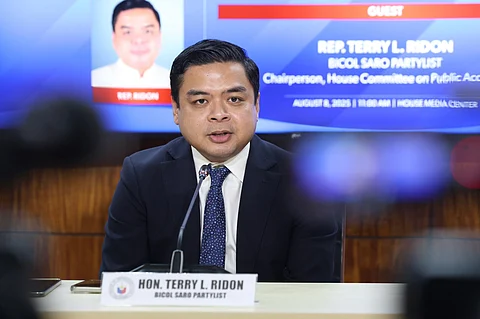
- NEWS
- the EDIT
- COMMENTARY
- BUSINESS
- LIFE
- SHOW
- ACTION
- GLOBAL GOALS
- SNAPS
- DYARYO TIRADA
- MORE

The House Committee on Public Accounts said Friday that it is still “premature” to launch a motu proprio investigation into alleged anomalies in the Department of Public Works and Highways’ (DPWH) flood-control projects, purportedly involving members of Congress.
Panel chair Terry Ridon said this could only proceed once the committee is furnished with the list of nearly 70 legislators accused of involvement in the alleged corruption scheme.
“The burden of showing, the burden of disclosure is on the persons accusing,” Ridon said in a briefing, referring to Senator Ping Lacson and Baguio City Mayor Benjamin Magalong. “The very specific allegations that 67 congressmen are contractors themselves did not come from us, but from someone else. So, unless and until there are names that are mentioned as to who these people are, it seems it might be a bit premature to conduct proceedings relating to it."
Ridon assured that the committee will act accordingly if allegations of irregularities in the flood-control projects — such as “ghost” programs and the use of substandard materials — arise during their ongoing hearings. He also pledged that no House member would be spared if proven involved in any anomaly.
Earlier this week, the panel held a briefing with the DPWH on the status of flood-control projects, in line with President Ferdinand Marcos Jr.’s directive for a thorough review of the multi-billion-peso program, which still falls short of addressing the country’s flooding crisis.
The President’s order came after three consecutive typhoons, coupled with southwest monsoons, submerged Metro Manila and nearby provinces despite his statement last year that 5,500 flood-control projects had been completed and more were under construction.
The situation fueled suspicions of massive corruption, with Lacson claiming that 67 House members in the previous Congress had full control over project funding because they or their relatives were allegedly contractors in the government’s flood mitigation program.
Magalong made similar accusations, alleging that lawmakers were receiving 30 to 40 percent kickbacks from flood-control and infrastructure projects.
The House leadership is reportedly planning to form a tri-committee, headed by the public accounts panel, to conduct an independent legislative inquiry into the DPWH’s flood-control program.
However, Ridon said it will take time before the probe begins, as the two other committees that will be part of the tri-committee have yet to complete their membership. He assured that Magalong will be among the first invited to substantiate his claims before the proper venue.
“I think it's fair that he would mention such things to the committee once an investigation has been conducted. But if the presentation, for example, would include an actual allegation that, for example majority of congressmen, legislators are involved in corruption allegations — I’ve heard in one interview that he mentioned something like that — that's the time when he will have to provide the names,” Ridon said.
Magalong, in response, said he is on standby and ready to appear before the House anytime if summoned.
Over the years, the government has allocated trillions of pesos for DPWH flood-control projects. In the 2025 budget, the agency received the second-largest allocation at P1.007 trillion, next to the education sector—which includes the Department of Education and Commission on Higher Education — at P1.055 trillion.
Marcos has already warned members of Congress that he will return the 2026 General Appropriations Bill (GAB) if it contains line items not fully aligned with his administration’s proposed budget, even if this results in a reenacted budget. He also stressed that those involved in corruption will be held accountable, regardless of political alliances.
